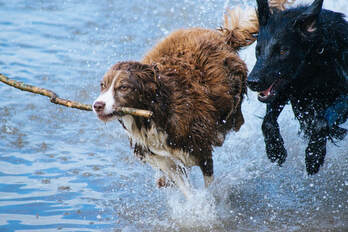Laurie Anne Walden, DVM  Leptospirosis is a disease caused by infection with Leptospira bacteria. The disease is zoonotic, meaning that it can pass from animals to humans. The bacteria are spread through the urine of infected animals and can remain in water or soil for months. Who’s at Risk Many different animals can carry Leptospira. Rodents are the most common sources of infection in people. Farm animals, wild animals, and dogs can also be carriers. (Cats are very rarely infected.) Leptospirosis is a public health hazard for people around the world. People are most often infected through contact with contaminated water, including recreational contact like swimming. Heavy rainfall and flooding increase the risk. Other routes of infection are direct contact with animal urine and contact with contaminated soil or food.[1,2] Dogs are infected the same way as people: through contact with urine, contaminated soil, or contaminated objects. Dogs can also be infected by eating infected animals. Pregnant dogs can pass the infection to puppies through the placenta.[3] Dogs are at increased risk for leptospirosis if they have access to any of the following:
Leptospirosis was once considered a disease mostly of working dogs and other outdoor dogs. But small-breed dogs that live in cities and have no access to outdoor water sources are also at risk because rodents carry the disease.[3] Symptoms Leptospirosis causes a wide range of problems, including kidney failure, liver failure, lung disease, eye damage, blood clotting disorders, and death. Some dogs infected with Leptospira have mild disease or no symptoms at all. The severity of disease depends on the Leptospira strain and the dog’s immune system, among other factors. Symptoms of leptospirosis in dogs vary but can include the following:
Leptospira infection can be diagnosed with blood tests. Dogs suspected of having leptospirosis generally also need other tests, such as urinalysis, x-ray examination, and ultrasound.[3] Treatment Dogs with leptospirosis are treated with antibiotics. Most require hospitalization for supportive care and intravenous fluid treatment. The prognosis is good for most dogs that are treated early in the course of disease. Dogs with kidney failure that is not aggressively treated and those with lung complications have a poorer chance of survival. Dogs with leptospirosis can infect people and other dogs. People handling infected dogs should take precautions like wearing protective clothing and avoiding contact with the urine. Prevention Leptospira vaccines are available for dogs. Talk to your veterinarian about your dog’s risk for leptospirosis. In some geographic areas, veterinarians recommend leptospirosis vaccination for all dogs, including those that live mostly indoors. Other precautions to reduce the risk of infection are washing hands after handling dogs, wearing gloves when cleaning or collecting dog urine, and using antibacterial solutions to clean surfaces that might be contaminated with urine. The Centers for Disease Control and Prevention recommends avoiding contact with contaminated water (don’t wade barefoot in floodwater!) or wearing protective clothing around potentially contaminated water or soil.[1] References 1. Leptospirosis. Centers for Disease Control and Prevention website. https://www.cdc.gov/leptospirosis/index.html. Accessed July 9, 2019. 2. Leptospirosis. World Health Organization website. https://www.who.int/zoonoses/diseases/leptospirosis/en/. Accessed July 9, 2019. 3. Sykes JE, Hartmann K, Lunn KF, Moore GE, Stoddard RA, Goldstein RE. 2010 ACVIM small animal consensus statement on leptospirosis: diagnosis, epidemiology, treatment, and prevention. J Vet Intern Med. 2011;25(1):1-13. Photo by Matt Jones on Unsplash Comments are closed.
|
AuthorLaurie Anne Walden, DVM Categories
All
Archives
June 2024
The contents of this blog are for information only and should not substitute for advice from a veterinarian who has examined the animal. All blog content is copyrighted by Mallard Creek Animal Hospital and may not be copied, reproduced, transmitted, or distributed without permission.
|
- Home
- About
- Our Services
- Our Team
-
Client Education Center
- AKC: Spaying and Neutering your Puppy
- Animal Poison Control
- ASPCA Poisonous Plants
- AVMA: Spaying and Neutering your pet
- Biting Puppies
- Boarding Your Dog
- Caring for the Senior Cat
- Cats and Claws
- FDA warning - Bone treats
- Force Free Alliance of Charlotte Trainers
- Getting your Cat to the Vet - AAFP
- Holiday Hazards
- How To Feed Cats for Good Health
- How to Get the Most Out of your Annual Exam
- Indoor Cat Initiative - OSU
- Introducing Your Dog to Your Baby
- Moving Your Cat to a New Home
- Muzzle Training
- Osteoarthritis Checklist for Cats
- What To Do When You Find a Stray
- Our Online Store
- Dr. Walden's Blog
- Client Center
- Contact
- Cat Enrichment Month 2024
|
Office Hours
Monday through Friday 7:30 am to 6:00 pm
|
Mallard Creek Animal Hospital
2110 Ben Craig Dr. Suite 100
|
Site powered by Weebly. Managed by IDEXX Laboratories

 RSS Feed
RSS Feed